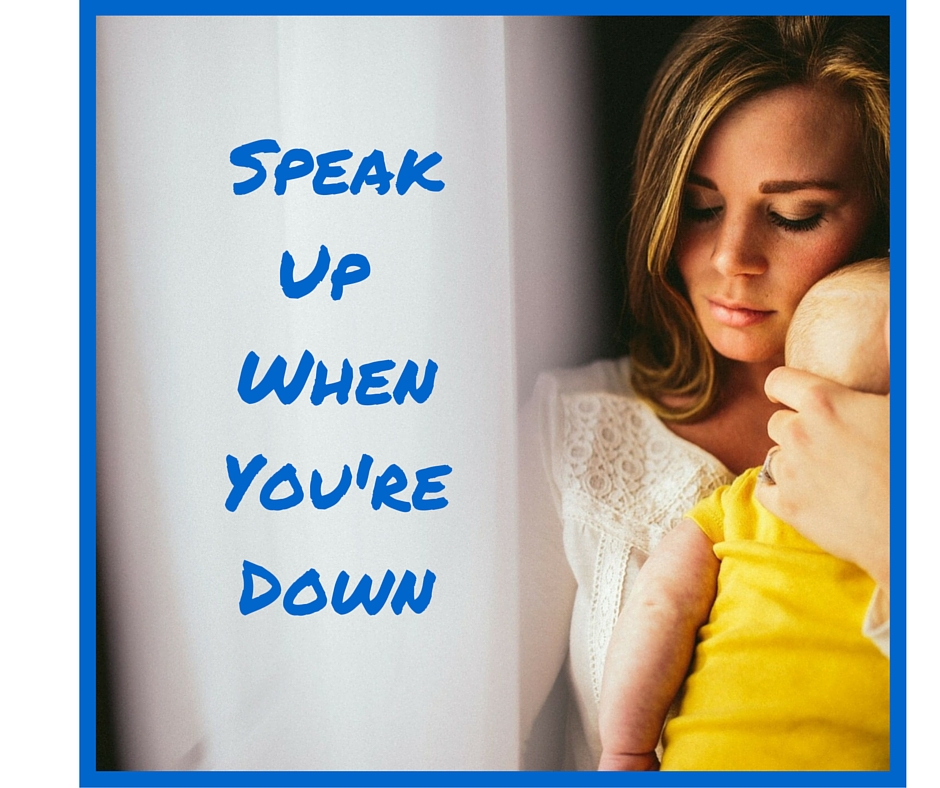Guest Blog on Postpartum Depression
From Belly Bliss to Dark Depression
Two minutes can feel like an hour when you’ve just taken a pregnancy test and are waiting for the results. When women see the two lines show up, they’re flooded with a wide range of emotions—from elation and awe to shock and fear. And guess what? All these emotions are okay. For many women, pregnancy isn’t a time of bliss, but fear, anxiety, and depression.
If you fall into that camp, I want you to know you’re not alone. In fact, the national rate for postpartum depression ranges from 10-20%–but get this—fewer than half the cases are recognized. Of these mothers, about half will have symptoms that last longer than one year.
What’s the difference between Postpartum Depression & the Baby Blues?
Giving birth is one of the biggest transitions a woman may face in her lifetime—but it’s also a time in her life where all of her time and energy are devoted to someone else instead of focusing on the self- care she needs. The combination of hormone changes, loss of sleep, and the stress of caring for a newborn are overwhelming to most new moms. It is very common for moms to experience the “baby blues,” a two-week period where many new mothers experience mood instability, exhaustion, sleep problems, and crying episodes.
If the baby blues worsen or last longer than two weeks after delivery, you may be suffering from postpartum depression (PPD). Postpartum Depression is a serious illness and a significant health concern—it’s also not you’re fault.
Women are sometimes a bit freaked out that they’re reacting this way to something as wondrous as the birth of their child, and often they don’t seek help. Please hear me on this—you are not alone, and it’s okay to ask for help.
Why do women get PPD?
The exact cause isn’t known. Many women have depression during pregnancy that worsens after delivery or a past history of depression. In addition, hormone levels that change during pregnancy and right after childbirth may also produce chemical changes in the brain that play a part in causing depression and anxiety. Feeling depressed doesn’t mean that you did something wrong or that you brought this on yourself.
Should I get help?
Absolutely. If you hear anything from this blog post, hear this: help is available and there is hope that you’ll feel better with treatment. Half of all mothers who develop PPD continue to have significant symptoms when their baby turns one, so it’s important to seek help as soon as possible.
How do I get help?
There are many people you can reach out to: your OBGYN/midwife, your child’s pediatrician, or a therapist. At Kindred Counseling, babies are always welcome so that childcare is one less thing to worry about. This is why I offer Walk + Talk Therapy, where your session is taken outside on a walk, where you can easily bring your baby along in the stroller or a carrier. This adds an endorphin boost to your session, decreases the need for childcare, and often increases your comfort level (I totally get that the idea of a therapist’s couch can be nerve-wracking!). Walk + Talk therapy can help you cope with stress and depression, improve your mood, reduce your tension and anxiety, and improve self- esteem and feelings of wellbeing.
What else can I do?
Even if Walk + Talk sessions aren’t your thing, exercise can be something you can try to help with your depression symptoms. Studies show that exercise has many benefits that contribute to wellness:
exercising decreases depression and anxiety, enhances brain plasticity (this is a fancy term for your brain’s ability to learn new things), increases your ability to regulate your emotions, and improves sleep. In addition, studies have shown that just being outside induces positive emotions (in both you and your baby!).
Don’t be afraid to ask for help from your partner, other family members, or friends. Your to-do list is probably a mile long—there’s no shame in asking for help with household chores, errands, or making a meal.
Even though your time and energy is very consumed by your child, try to add in moments of self-care. I’ve always believed nap time should be used for you—to nap, take a relaxing shower or bath, catch up with a friend, listen to music, or peruse social media.
Taking care of yourself in your baby’s first year is one of the best things you can do for both of you: sleep when you can, fuel your body with healthy foods, and ultimately, give yourself grace. Parenting isn’t easy, and there’s no perfect way to get through the first year.
Important: If you are having moments where it seems like you can see or hear things no one else can, if you are feeling paranoid as if others are out to get you, or if you are having thoughts of harming yourself or others, it’s important to reach out for help right now. These symptoms require immediate attention as you could be experiencing Postpartum Psychosis. If you have these symptoms, your illness has the potential to take over and lead you to do things that you wouldn’t normally do. In order to avoid that it is important to reach out for help right away so that trained professionals can help you get stabilized and healthy. There are countless women who have had postpartum psychosis and recovered 100%.
Resources for Assistance or Further Information:
http://postpartumprogress.org/COMMUNITY/
EMERGENCY CALLS: 911
SUICIDE PREVENTION HOTLINE: 1-800-273-TALK (8255)
Learning the tools to help you love yourself first helps you love others better.
Learn more about Brittni at: www.kindred-counseling.com & www.facebook.com/kindredcounseling
Guest blog on http://happywithbaby.com


